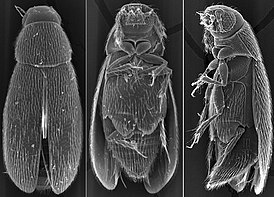Nanosella
Nanosella | ||||||||||||||||||||||
|---|---|---|---|---|---|---|---|---|---|---|---|---|---|---|---|---|---|---|---|---|---|---|
| Научная классификация | ||||||||||||||||||||||
|
||||||||||||||||||||||
| Латинское название | ||||||||||||||||||||||
| Nanosella Motschulsky, 1868[1] |
||||||||||||||||||||||
| Синонимы[2] | ||||||||||||||||||||||
| ||||||||||||||||||||||
|
Nanosella (лат.) — род мельчайших жуков из семейства перокрылки (Ptiliidae), мельчайшие представители отряда жесткокрылые и одни из мельчайших насекомых в фауне России[3]. Относится к трибе Nanosellini, включающей самых мелких жуков мировой фауны[4]. В России представлены единственным видом Nanosella russica, впервые найденным на Дальнем Востоке на острове Русский (Приморский край)[3]. Род был выделен российским энтомологом Виктором Ивановичем Мочульским[1].
Распространение
[править | править код]Северная, Центральная и Южная Америка, Дальний Восток России[2].
Описание
[править | править код]Длина тела от 0,25 (Nanosella fungi) до 0,5 мм. Тело вытянутое, овально-цилиндрическое; коричневого цвета; боковые края проторокса наиболее широки у своего заднего края. Глаза состоят примерно из 40 омматидиев. Антенны 10-члениковые. Формула щетинок ментума — 2+2+1. Жуки обитают в споровместилищах трутовых грибов[5], в том числе на Trametes sp., Skeletocutis amorpha, Trichaptum biforme (на ольхе), Coriolopsis trogii (на дубе)[3].
- Nanosella russica — Россия, остров Русский (Приморский край)
- Nanosella fungi (LeConte, 1863) — США typus
- Nanosella atrocephalus Dury, 1916[6]
- Nanosella biclavatus (Friedenreich, 1883)
- = Mycophagus biclavatus Friedenreich, 1883
- Nanosella matthewsi Barber, 1924[7]
- Nanosella panamensis (Barber, 1924)
- = Mycophagus panamensis Barber, 1924[7]
- Nanosella robustus (Barber, 1924)
- = Mycophagus robustus Barber, 1924[7]
См. также
[править | править код]Примечания
[править | править код]- ↑ 1 2 Motschulsky, V. von. (1868). Enumeration des nouvelles especes de Coleopteres, rapportes de ses voyages. — Bulletin de la Societe Imperiale des Naturalistes de Moscou 41(2): 170-192.
- ↑ 1 2 Hall W. E. Generic Revision of the Tribe Nanosellini (Coleoptera: Ptiliidae: Ptiliinae) (англ.) // Transaction of the American Entomologival Society. — 1999. — Vol. 125, no. 1–2. — P. 36–126. Архивировано 25 августа 2018 года.
- ↑ 1 2 3 Polilov, A. A. An introduction to the Ptiliidae (Coleoptera) of Primorskiy region with descriptions of three new genera, new and little known species // Russian entomological journal. — 2008. — Т. 17. — С. 149–176. Архивировано 4 марта 2016 года.
- ↑ Andersen, J.; Hanssen, O.; Ødegaard, F. Baranowskiella ehnstromi Sörensson, 1997 (Coleoptera, Ptiliidae), the smallest known beetle in Europe, recorded in Norway (англ.) // Norwegian journal of entomology. — 2003. — Vol. 50, no. 2. — P. 139-141. Архивировано 30 января 2020 года. Abstract Архивная копия от 4 марта 2016 на Wayback Machine
- ↑ W. Eugene Hall. Nanosella fungi (англ.). «Tre of Life» web project (tolweb.org) (1997). Дата обращения: 9 августа 2011. Архивировано из оригинала 24 августа 2012 года.
- ↑ Kevina Vulinec and R. A. Davis. (1984). Coleoptera Types in the Charles Dury Collection of the Cincinnati Museum of Natural History. — The Coleopterists Bulletin Vol. 38, No. 3 (Sep., 1984), pp. 232-239
- ↑ 1 2 3 Barber H.S. New Ptiliidae related to the smallest known beetle (англ.) // Proc. Ent. Soc. Wash.. — 1924. — Vol. 26, no. 6. — P. 167-178.
Литература
[править | править код]- Hall W. E. Generic Revision of the Tribe Nanosellini (Coleoptera: Ptiliidae: Ptiliinae) (англ.) // Transaction of the American Entomologival Society. — 1999. — Vol. 125, no. 1–2. — P. 36–126.
- Polilov A. & Bibin A. An introduction to the Ptiliidae (Coleoptera) of the Caucasian reserve with the description of new and little known species // Russian Entomological Journal. — 2004. — Т. 13, № 3. — С. 1–5.
Ссылки
[править | править код]- Nanosella (англ.). Eol.org. Дата обращения: 2 августа 2012. Архивировано из оригинала 18 мая 2012 года.
- Nanosella (англ.). Biolib.cz. Дата обращения: 2 августа 2012.
